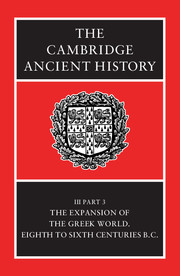Book contents
- Frontmatter
- Contents
- List of maps
- List of text-figures
- Preface
- 36a The Greeks in the Near East
- 36b The Greeks in Egypt
- 36c Cyprus
- 36d The Cypriot syllabary
- 37 The colonial expansion of Greece
- 38 The western Greeks
- 39a The eastern Greeks
- 39b Crete
- 39c Cretan Laws and Society
- 39d Euboea and the Islands
- 40 Illyris, Epirus and Macedonia
- 41 Central Greece and Thessaly
- 42 The Peloponnese
- 43 The growth of the Athenian state
- 44 The Tyranny of Pisistratus
- 45a Economic and social conditions in the Greek world
- 45b The material culture of Archaic Greece
- Chronological Table
- BIBLIOGRAPHY
- Index
- References
45a - Economic and social conditions in the Greek world
Published online by Cambridge University Press: 28 March 2008
- Frontmatter
- Contents
- List of maps
- List of text-figures
- Preface
- 36a The Greeks in the Near East
- 36b The Greeks in Egypt
- 36c Cyprus
- 36d The Cypriot syllabary
- 37 The colonial expansion of Greece
- 38 The western Greeks
- 39a The eastern Greeks
- 39b Crete
- 39c Cretan Laws and Society
- 39d Euboea and the Islands
- 40 Illyris, Epirus and Macedonia
- 41 Central Greece and Thessaly
- 42 The Peloponnese
- 43 The growth of the Athenian state
- 44 The Tyranny of Pisistratus
- 45a Economic and social conditions in the Greek world
- 45b The material culture of Archaic Greece
- Chronological Table
- BIBLIOGRAPHY
- Index
- References
Summary
Introduction
During the three centuries surveyed in this chapter (800–500 B.C.) the economic and social structure of the Greek world underwent massive alterations which set the framework for the Classic age. The general character and the tempo of development can be discerned; causes and interrelationships are often obscure. For present purposes Hesiod (Works and Days only), Solon, Theognis and Herodotus provide the most valuable literary testimony. The difficulties in using Homer as a historical source, suggested in CAH II.2, chapter 39b, must lead one to cite the epics only with caution; Aristotle, Plato and other later authors are occasionally helpful if we keep in mind their very different intellectual milieu. Significant archaeological evidence will be noted briefly, for the second part of this chapter will survey the physical material more fully.
Economically the volume of output increased tremendously, as measured against earlier centuries, and was much diversified in types of products and in their styles. Industrial and commercial activity tended to concentrate at urban centres in the more advanced parts of Greece. After his conquest of Asia Minor the Persian king Cyrus asked about the nature of the Spartans (Hdt. I. 153), and upon receiving an answer purportedly commented, ‘I have never yet been afraid of any men who have a set place in the middle of their city, where they come together to cheat each other and forswear themselves.’ To this emphasis on the role of economically independent elements in Hellenic markets a modern observer would add the important fact that the accepted Greek standard of value had by Cyrus' day become coined money, even if coins themselves were not always actually used in the exchange of goods and services.
- Type
- Chapter
- Information
- The Cambridge Ancient History , pp. 417 - 441Publisher: Cambridge University PressPrint publication year: 1982
References
- 5
- Cited by



